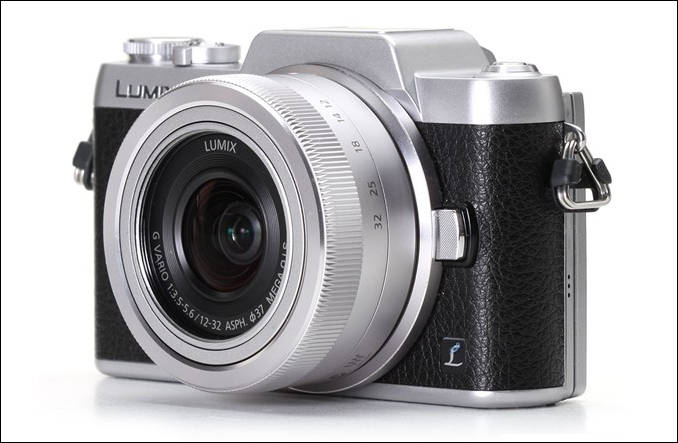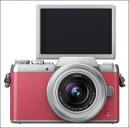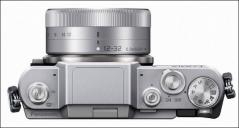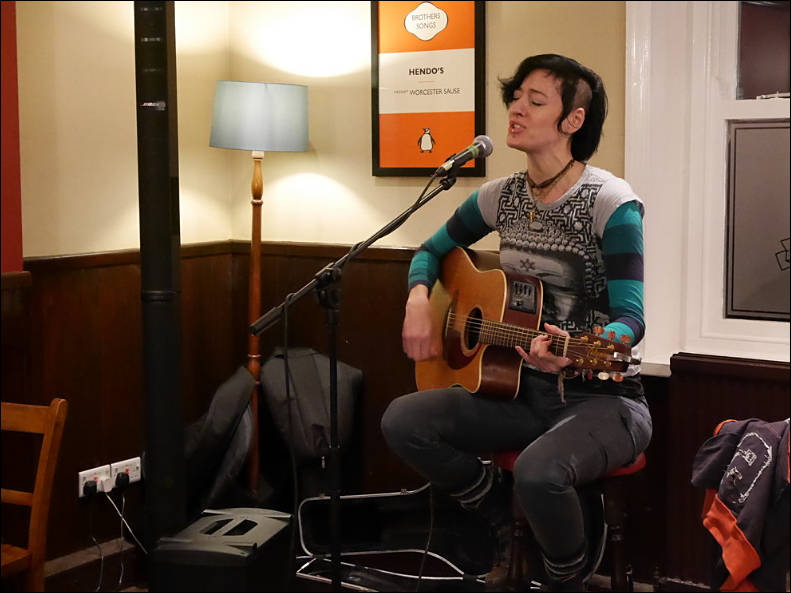
It allows to keep PV going, with more focus towards AI, but keeping be one of the few truly independent places.
-

Rumored specs
- 16Mp CMOS sensor
- 2D improved advanced noise reduction
- Dynamic range extender
- Usual for Panasonic 240fps mode for fast AF
- -4EV capable low light AF
- Tilting LCD, opens up 180 degrees like NX300M
- 1080p50, 1080p60 video recording
- Wi-Fi
- 12-32mm kit lens
- Available in silver, brown and pink
- Tilting LCD screen
- $599
- Available at http://www.amazon.com/dp/B00S86L6DI

 samsung5.jpg678 x 443 - 44K
samsung5.jpg678 x 443 - 44K
 samsung6.jpg590 x 586 - 51K
samsung6.jpg590 x 586 - 51K
 samsung7.jpg600 x 322 - 27K
samsung7.jpg600 x 322 - 27K
 samsung8.jpg605 x 344 - 25K
samsung8.jpg605 x 344 - 25K -
PR
Panasonic is pleased to announce a new Digital Single Lens Mirrorless (DSLM) Camera, the DMC-GF7 (GF7). The GF7 offers modern selfie shooting features – one of the world’s most powerful trends - in a classic styled camera with its 180-degree flip-up monitor and a variety of creative functions. The GF7 will be available at panasonic.com and photo retailers.
The rear monitor is a 3.0-inch 1,040K-dot touch screen LCD. It offers not only high visibility but also intuitive operation with touch control. The monitor tilts up to approx.180-degrees and puts the camera into Self Shot Mode automatically. In the Self Shot Mode, a variety of functions for selfie – Face Shutter, Buddy Shutter and beauty functions - are enabled. With Wi-Fi® connectivity, users can connect the camera to their smartphone / tablet to expand shooting flexibility. Pairing the camera and the smartphone is quick and easy, even without a need of inputting a password. It is possible to use a smartphone / tablet as a multi-capable remote shutter with a monitor. With the Instant Transfer function, photos are automatically sent to the smartphone / tablet immediately after shooting. On the other hand, both photo and video can be archived to a computer via the wireless access point (router) at home. The GF7 now integrates Jump Snap which lets users to photograph themselves jumping as if they are flying in the air using a remote control function via Wi-Fi.
The photographic performance of GF7 is excellent for a broad range of photographic expertise. It enables end-users high-quality image capture with real-life details through high resolution, image rendering and color reproduction. Taking full advantage of a 16.00-megapixel Digital Live MOS Sensor and a Venus Engine, images are produced with sharp resolution even when exposed in low-light situations when ISO 25,600 is selected. The Contrast AF System of the GF7 excels in both speed and accuracy by exchanging the digital signal between the camera and the lens at max. 240 fps. A variety of extensive AF functions including Face/Eye Detection AF, Low Light AF, Pinpoint AF and One-shot AF enhance usability to help in a wide-range of shooting situations.
The GF7 also features full HD 1920 x 1080, 60p (60 Hz) high quality video recording in AVCHD progressive and MP4 with stereo sound. The practical full-time AF and tracking AF are available in video recording as well. The cinema-like 24p video with the bit rate of max. 24 Mbps provides richly expressive afterimage with overwhelming image quality. The GF7 features a new video recording option called Snap Movie Mode which lets users record video in designated short period of time (2/4/6/8 sec.) as they shoot “moving photos”.
Last but not least, the iA(Intelligent Auto) mode and the Scene Guide make GF7 easy to use even for beginners. Portrait, Child, Scenery modes, which are used often, have respective shortcuts on the dial.
Available in black and pink, with a 12-32 kit lens, the GF7 boasts a sleek, stylish profile in traditional camera design. Its small size enables users carry it around and enjoy creative, high quality photography with the unlimited potential of an interchangeable lens system camera.
A New Hands-Free Selfie
In Self Shot Mode, Face Shutter and Buddy Shutter are integrated for an automatic shutter release. They work when the face is covered with a waving hand or when two faces come closer in a frame.Ultimate Picture Quality Goes Beyond Expectations
The GF7 incorporates a 16.00-megapixel, large Digital Live MOS Sensor with a Micro Four Thirds system standard that achieves both higher resolution and higher sensitivity image recording with less noise. The photodiode in each pixel is enlarged thanks to the adoption of cutting-edge Semiconductor Fine Technology to improve color saturation and the redesigned on-chip lens enhances light condensation to achieve high sensitivity. Noise generation is minimized in both pixel circuit and digital signal readout circuits to provide an excellent S/N ratio.
The Venus Engine makes it possible to remove large blocks of noise which were formally hard to detect and helps produce clear, smooth images especially with nighttime photography. In addition, the Multi-process NR (Noise Reduction) works in two separate steps allowing even finer control over noise level. This results in improved reproduction of smooth human skin even in high sensitivity recording.High Level of AF Performance
All LUMIX G, and the new GF7 use Contrast AF for its focus system. Compared to the phase difference system, Contrast AF boasts higher accuracy especially when shooting with a fast lens with small F value. The GF7 features high-speed Light Speed AF, making it possible to capture even fast-moving subjects clearly. Not only the accuracy but also the speed of AF in the GF7 surpasses the high-end DSLRs with phase difference. The camera and the lens exchange the digital signal at max. 240 fps to minimize the time to focus. The GF7 has high speed burst shooting at approx.5.8 fps (AFS) / approx.5 fps (AFC, 1-area AF) in 16.00-megapixel and max. 40 fps using an electronic shutter.Easy Wireless Connectivity via Wi-Fi® with Smartphones
The GF7 integrates Wi-Fi® connectivity (IEEE 802.11 b/g/n) to offer more flexible shooting experience and instant image sharing with easy operation. Once connected the camera and smartphone/tablet installing Panasonic's dedicated application software Panasonic Image App for iOS / Android, users can shoot / browse / share images remotely.
The GF7 newly integrates Jump Snap. By holding the smartphone in your hand or having it in the pocket, the smartphone detects the highest position when the user jumps and releases the shutter of the camera which is located away from the user in advance. It lets users to photograph themselves jumping as if they are flying in the air.Full-HD 60p (60Hz) High Quality Video Recording Performance
The GF7 records stunningly smooth, high-resolution full-HD 1,920 x 1,080 60p (60 Hz) videos in AVCHD Progressive or MP4 (MPEG-4 / H.264) format. The DMC- GF7 also supports 1080/24p native mode with 24 Mbps in AVCHD format bringing impressive afterimage to the footage. The full-HD 1,920 x 1,080 60p (60 Hz video can also be recorded in AVCHD progressive / MP4 at 28 Mbps. Thanks to optimum pixel-mix technology which is made possible by the improvement of sensor sensitivity, sharpness and clarity are improved in video, too.
In addition to the practical full-time AF, the Touch AF in video recording also lets users enjoy professional-like rack focusing. The AF Tracking locks on the subject even it moves.
High quality sound can be recorded with Dolby® Digital. A Wind Cut function is also available to block out most of the noise from background wind. The Extra Tele Conversion function virtually extends the zoom range Max. 4.8x without deterioration of image quality in smaller resolution.
The GF7 features a new video recording option called Snap Movie Mode. Users can record video in designated short periods of time (2/4/6/8 sec) as they shoot “moving photos”. In this function, rack focusing or addition of fade effect (color in/out, black in/out, white in/out) are available. Those short video clips are can easily be shared using the Panasonic Image App.
-
looks like a repackaged gm1 ...but with a....ah bump. What's that all about ? A flash ....a hidden hotshoe ...a flipup evf ?
-
The question is whether Pana will break the GF series curse of 1080 having real resolution of 720. It's 4K era, isn't it? If it still has 720 sold as 1080 that's a joke.
I'm not holding my breath for AE lock to work while recording which Pana implemented in NONE of its cameras so far, nor do I for Auto-ISO in M mode which has been implemented only in GH4.
So what's the point of this model? CM1 got upgraded with EVF in CM5. Looks like they are going to sell just a redesigned CM1 as GF7. Yawn.
-
I've read more about it. Unlike CM1 it has 180 degree tilting screen and it comes in PINK! I've changed my mind. A pink camera optimized for selfies! This is HUGE, guys!
-
What you saw that it comes in pink? I mean it is main property that every serious camera need.
-
Latest rumors can't be wrong. http://www.43rumors.com/ft5-full-panasonic-gf7-specs/
-
If the spec is true, then the GF7 is a G6 in a small body.
It means GF7 has the same, maybe a tweaked, GH2 sensor with a modern AF module and a new Venus Engine which is proved to be a good 1080p50/60 machine.
-
It means GF7 has the same, maybe a tweaked, GH2 sensor with a modern AF module and a new Venus Engine which is proved to be a good 1080p50/60 machine.
Well, isn't it slightly late to release such camera? I know that GF line was always unloved child of Panasonic, but...
-
Lumix GF7 might not have a place for professional and amateur movie makers even as their daily hybrid still/video camera. 4K GH4 is what Panasonic meant for professional and amateur movie makers. However, please remember that somewhere in our world even accessing youtube on smooth 720p25 HD is almost a dream.
May be Panasonic should refine their Lumix lines into three class GH, G, and GM? And Panasonic could give their resources by open the firmware source code and to fund personal-view.com for tweaking all the parameter of their Lumix into the limit via PTOOL.
The firmware tweaking activity will give Panasonic inputs on how the movie makers and hackers wants from their Lumix lines. It will be beneficial for them to design future Lumix lines and push sales. They should take this road. What do you think @Vitaliy_Kiselev?
-
However, please remember that somewhere in our world even accessing youtube on smooth 720p25 HD is almost a dream.
You can also remember that you can always get Samsung NX300 or NX300m (if you want 180 titled screen), cheaper and better.
-
Wish they'd put more variants in their cameras. If Panasonic would make one of these G cameras more iso-optimized for low-light, instead of offering 4k and other video features, I'd be picking it up on top of my gh4.
Seems like Sony differentiated the cameras in their A series – one has extreme resolution, one has excellent low-light performance, one has a middle ground of all the features, etc, etc.
-
For doing simple pieces to camera when on the road, this looks perfect. Small, built-in monitor, codecs and frame rates compatible with my three G6 bodies, cheap—what's not to like?
-
Review

The Panasonic Lumix GF7 is a fresh update from Panasonic to the entry level compact system camera market, and the camera looks much better than the model it replaces. Not only does it look better, but it is noticeably smaller and the new design should appeal. With the inclusion of the pancake zoom 12-32mm lens, the camera is also very pocketable, even with the lens on. The 12-32mm lens performs well, with a useful 24mm equivalent at the wide-angle end of the lens, although macro performance is better with other lenses. Image quality is good with the camera using the same sensor as the GX7, with good noise performance and detail up to ISO3200.
http://www.ephotozine.com/article/panasonic-lumix-gf7-review-26799

 samsung4.jpg791 x 593 - 61K
samsung4.jpg791 x 593 - 61K -
Meanwhile no G7 in sight for a very long horizon. And IBIS looks more and more like an once in a lifetime GX7 adventure. :(
I guess I'll have to see what the E-M5 Mk 2 brings in sensor readout improvement and frame rates. The codec seems to finally have been addressed.
-
@duartix I never turn into Panasonic Lumix until I know that @Vitaliy_Kiselev hack makes Lumix body capable of producing high quality video. Here PTOOLs is a factor! But do this GF7 "selfy" thing will be a factor for most people to acquire it?
Nowadays other manufactures catch up or even surpass most competitive benefits of Lumix lines. There are also, until this date, no new PTOOLs to liberate the potential power of the latest Lumix bodies.
I think Panasonic should just open their firmware code including this cute GF7 to @Vitaliy_Kiselev and team and let this community decide how far we want to push the hardware of our Lumix bodies. Here once again PTOOLs will be a factor! Otherwise, other manufactures will take away Panasonic DSLM consumer. Take a look on how Sony A7s take away some of potential GH4 consumer and GH2/GH3 user who looking for upgrade.
-
As for EM5 II, besides IBIS, which is fantastic, there are two little practical things I like about Oly EM5 that none of Pana cameras has: proper AE/AF lock functioning during video recording, and proper AF+MF focus mode, you can either dial focus or force AF by half-pressing shutter button at any time you will.
If they add 25p and robust codec (I don't even need all-I), I'm sold. Swivel LCD is a strong point, as well. This is gonna be my main handheld camera.
There are two major drawbacks still. 1. No dedicated audio in. You can buy SEMA-1 hot shoe mic adapter, however. But once it's there you cannot mount a mic, you need to mount it on a rig or a bracket - I'm not happy about it. 2. ~25 minutes time limit.
I don't think they are going to change this in MK II.
-
@yskunto : IMHO, the need for PTTOOLS has very much faded since...
Both the GH3/GH4 have much higher bitrate codecs. And most of all latest models have upped their h.264 profiles (providing much better IQ for the same bitrate) in such a way that it's hard to get a challenged output. Such an example was the GX7.
-
GF7 is not designed as a replacement of the GX7, but as a new iteration of the GM1 line: slightly larger, but with the flip screen. Everything is designed to keep the GF7 size and its cost as small as possible. I would not speculate on any further developments of the Panasonic cameras based on the GF7, except of the apparent stress on the wireless networking capabilities of the digital cameras.
-
I'll wait until I see footage from the GF7 before passing judgement on its quality/usability. The Fujis are supposed to have crap video, but I shot a piece to camera recently on an X-100s that was perfectly acceptable (at 30fps, which I know filmmakers don't use but which renders movement nicely, for our purposes).
As well, I want to know whether any of these arm-waving > focus on face modes can be used for video too—that's always the hard part if you are on your own. It looks like a toy, but the fact it uses the µ4/3rds lenses makes it, potentially, a useful toy.
Howdy, Stranger!
It looks like you're new here. If you want to get involved, click one of these buttons!
Categories
- Topics List23,990
- Blog5,725
- General and News1,353
- Hacks and Patches1,153
- ↳ Top Settings33
- ↳ Beginners256
- ↳ Archives402
- ↳ Hacks News and Development56
- Cameras2,367
- ↳ Panasonic995
- ↳ Canon118
- ↳ Sony156
- ↳ Nikon96
- ↳ Pentax and Samsung70
- ↳ Olympus and Fujifilm101
- ↳ Compacts and Camcorders300
- ↳ Smartphones for video97
- ↳ Pro Video Cameras191
- ↳ BlackMagic and other raw cameras116
- Skill1,960
- ↳ Business and distribution66
- ↳ Preparation, scripts and legal38
- ↳ Art149
- ↳ Import, Convert, Exporting291
- ↳ Editors191
- ↳ Effects and stunts115
- ↳ Color grading197
- ↳ Sound and Music280
- ↳ Lighting96
- ↳ Software and storage tips266
- Gear5,420
- ↳ Filters, Adapters, Matte boxes344
- ↳ Lenses1,582
- ↳ Follow focus and gears93
- ↳ Sound499
- ↳ Lighting gear314
- ↳ Camera movement230
- ↳ Gimbals and copters302
- ↳ Rigs and related stuff273
- ↳ Power solutions83
- ↳ Monitors and viewfinders340
- ↳ Tripods and fluid heads139
- ↳ Storage286
- ↳ Computers and studio gear560
- ↳ VR and 3D248
- Showcase1,859
- Marketplace2,834
- Offtopic1,319










